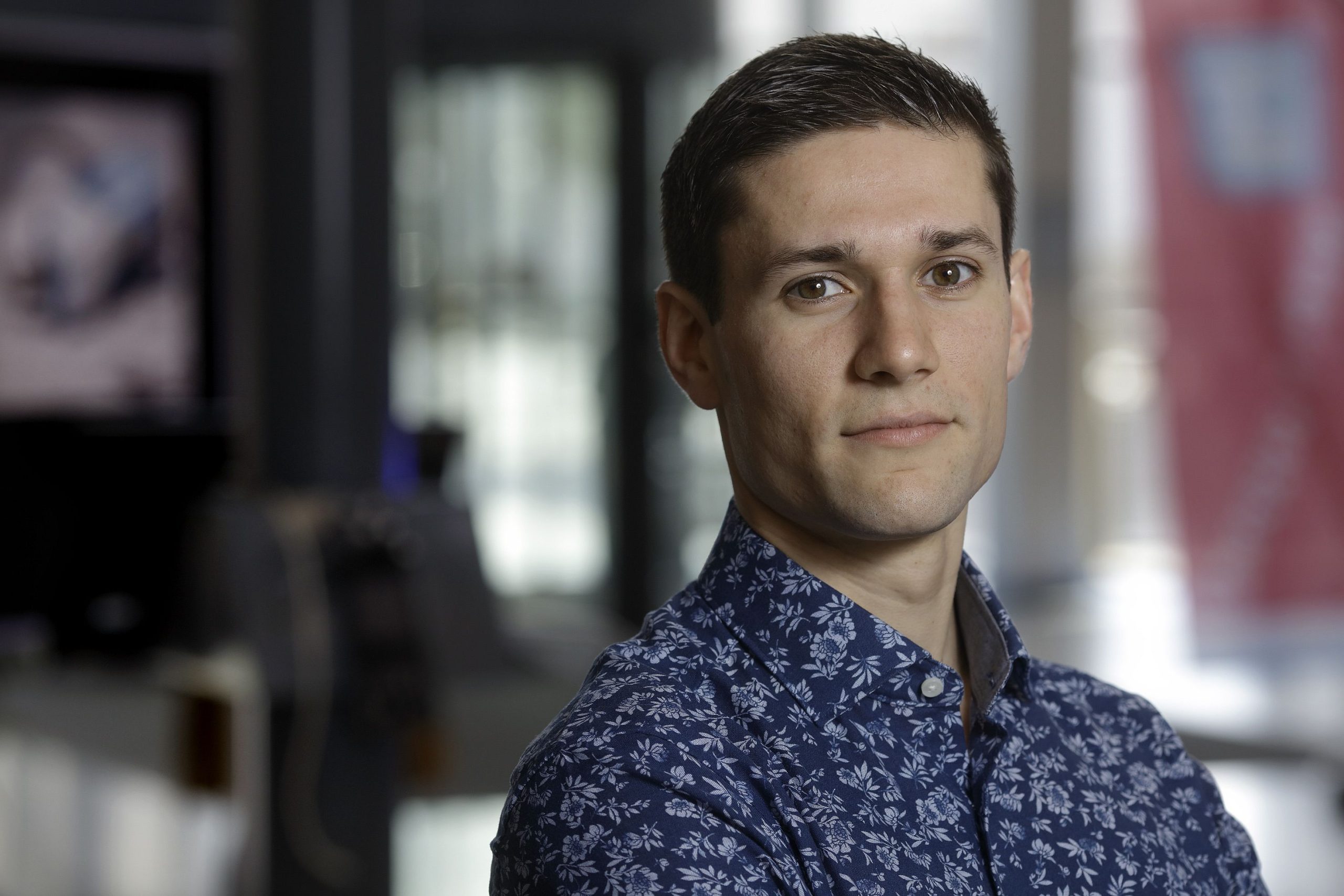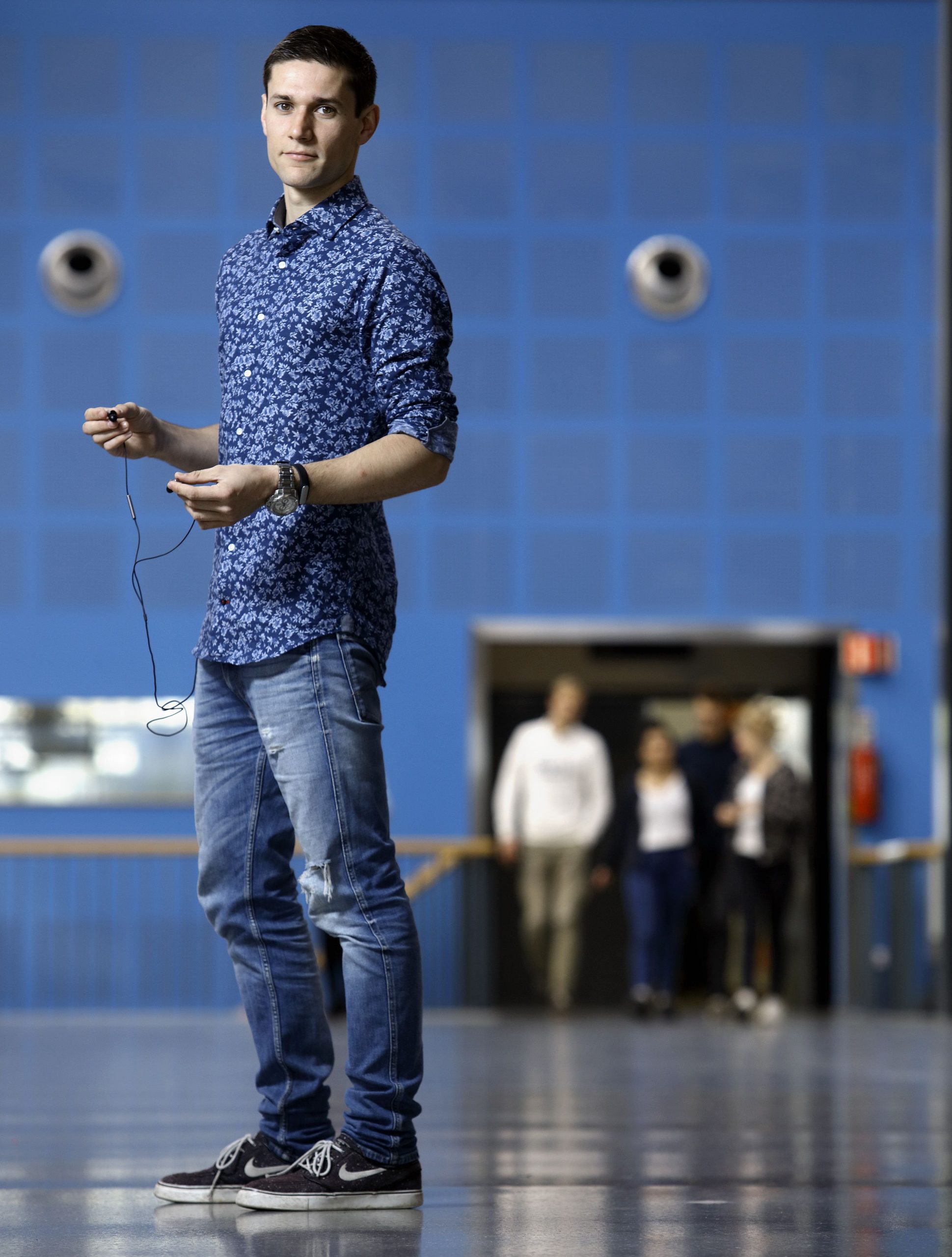Timothy Somers is a bachelor’s student in the Faculty of Industrial Design Engineering (IO) at TU Delft. After a successful internship in Shanghai with design agency Design2Gather his CV now boasts not one, but two international design awards: an iF Design Award 2016 and a Red Dot Design Award 2016.
We hear that industrial design wasn’t your first choice of study?
“No. I grew up in Terneuzen, a small town in the south of the Netherlands, where I started designing at an early age. In high school I had a physics teacher that was always telling us about TU Delft, and motivating us to make the right choice. I noticed that I was very technically oriented, and he told me that I could do aerospace engineering, and if I would be able to do it, I should. It interested me and I went to some open days and decided to choose it as my study. But after six months, I realised it wasn’t for me. There was too much theory, and I was just not challenged in a creative way at all. I had already been doubting between aerospace engineering and industrial design in the first place, so when aerospace engineering didn’t work out, I decided to pursue industrial design. As soon as I started at IO I knew I’d made the right choice. I learned a lot from the industrial design courses and after two years, for my minor, I got the perfect opportunity to go to Shanghai in China to do an internship.”
How did that come about?
“I was skiing in Austria, meeting some people my sister knew, and I started talking to someone who was working as a designer in Shanghai. I told him I was studying industrial design and that I wanted to do an internship abroad. He told me to send him an email and he’d see what he could do. So I did. Before I knew it, I was booking my ticket to Shanghai. It was the right place, right time with the right people.”
How long were you in Shanghai?
“I was there for seven months, and it was a very pleasant experience to work in an international environment. Design2Gather is run by Dutch people, and we went through a lot of projects pretty fast and achieved a lot. It’s a start-up so we tried out a lot of different things, and that’s also why we accomplished so much, because we had so much freedom to try things out.”
Tell us about SenCbuds, the award winning project?
“SenCbuds is a headset that not only offers the user a good listening experience, but it offers a unique user experience. It reacts or responds to the user. So if they’re attached to your phone and you put them in your ears the music automatically starts to play, and if you take them out it pauses as though waiting for you. That’s what makes them unique. It’s not a big new innovative technology, but it creates this special user experience.”
What was your role on the project?
“SenCbuds was the first project I was assigned. The electrical circuit had already been developed, the system was already there, and the next step was to house the system. It just needed a sleek design, something that would make it an actual product. So that’s what I started to do, to fit in all the components and to make it as compact as possible. That took one or two months, and when the final design was confirmed by the client I started to create it in 3D and think about how it was going to be produced, how it would work, how it would fit together and be assembled in the factory. Once a fully functional prototype was available, I took the prototype and started revising it to be sure all the minor flaws were corrected. That was basically my job.”
Can you tell us about the iF Design Award? Where were you when you found out about that?
“I was in Shanghai for seven months, and by then we’d already finished most of the project and it was at the factory to be developed for production. On the day that I left Shanghai to come back to the Netherlands, I was on my way to the airport when I got the call from the guys at Design2Gather who told me that SenCbuds was selected as a winner of an iF Design Award. It felt unreal; it was hard to believe especially because I am still really new in the field of design.”
How was the iF awards ceremony in February ?
“It was in Munich at the BMW Welt. It was one big networking event, with 2,000 visitors from all over the world. As a student, I was one of the youngest there. I was an underdog between all these guys that you usually only read about or see in the news, but rather than treating me like a rookie, that fact amazed them. I saw people from Ferrari, BMW, Philips and Dutch agencies like VanBerlo and Spark. It was very easy to connect with them because they were all there to listen to each other’s stories; it was an opportunity you usually don’t get. At one point I was talking to the CEO of VanBerlo with-out even knowing it.”
Did you go alone?
“No, I was with my dad! No one else from the design agency was there since they were all in Shanghai, and our client Vivnnovation is based in New Zealand. Since I was in the Netherlands I got the honour of going to represent both the client and the design agency.”
And then came a Red Dot Award?
“Yes, that was announced in March. I was back in the Netherlands at IO when they called me and told me about it. I think that’s one of the most prominent awards in design, a Red Dot Award. Most of the pleasure that comes from winning comes after the fact, when you’re telling other people about it and you see their response. When I say I won a Red Dot Award people are amazed. I didn’t do it alone, of course, but with the entire team at Design2Gather.”
What do these awards mean in practical terms for young designers like you?
“In a way, it’s the best recognition you can get. Winning a design award is a label of excellence and quality. As a designer you constantly try to prove yourself, and make something that people will remember you for. And you meet people at these awards ceremonies who you will be working for, or working with, and that’s a unique advantage.”
What’s the current position with SenCbuds?
“It’s now with the client. They’re developing SenCbuds to be as efficient as possible price-wise and quality-wise for their new Kickstarter campaign. We hope to see them for sale from October.”
What is your plan now?
“Getting a visa for China was hard, and my visa is valid until July, so I’ve decided to return to Shanghai and make use of it. I’ve learnt way more doing the internship than I did studying, and I want to keep developing myself. I thought it was a good chance to go back, whilst I can, to continue diversifying my portfolio and work on different projects. I’ll come back in June to sit an exam, and then have a summer holiday, and in September I’ll begin my final bachelor’s project.”
Will a master’s degree follow that?
“I don’t know yet. When I finish my bachelor’s in January 2017 I hope to do more internships and see how things work on different continents, so in Europe and the US, for example. I’ve planned half a year for that.”
Where do you see yourself in 5 or 10 years’ time?
“In 5 years’ time I hope to have become a real talent in the field of design, by learning a lot of new skills and diversifying my portfolio to show what I’m capable of. In 10 years’ time I hope to be running my own design agency with the knowledge and experience and expertise that I’ve learned from working with and meeting a lot of interesting professional people, the types of people you interact with during internships like in Shanghai.”
Do you have any advice for fellow design students?
“In the bachelor’s for industrial design you learn a lot of ways to complete a design process to get to a product. As soon as I arrived in Shanghai I forgot all these methods and decided to go my own way, and do things how I thought they should be done. That’s a very pleasant way to work. I developed my own way of designing and that’s something I would recommend to other students, to not stick too much to the methods, but to explore your own preferences.”
How did you like living in Shanghai?
“Shanghai is not a bad place to be, you feel like you’re in the centre of the world. Barely anyone speaks English, so communication was very hard; you go back to basics using gestures with your hands to explain yourself. It’s funny in a way, but gets frustrating after a while, and it’s something I struggled with, but eventually you figure out your way around. It’s very different living somewhere than just going on holiday, but it’s an international city with international students and expats. I ended up living in a very high building with five other people from Italy, Belgium, Germany and Ireland. It was nice living with these people; we were all in the same boat. There’s a very big difference in cultures, which made it quite a challenge, but was to be expected.”
Is there any other factor motivating your return to Shanghai, a romantic interest perhaps?
“Yes, I met an American girl there! She studies in Shanghai and knows her way around, so she showed me a lot and we spent a lot of time together. She even visited me in the Netherlands afterwards.”
 CV
CVCV
Timothy Somers (1993) completed his bilingual VWO at Zeldenrust-Steelantcollege in Terneuzen before coming to TU Delft, where he is currently a bachelor’s student of industrial product design. He has experience as a graphic designer for BluLocks in Delft, and as a product designer for Design2Gather in Shanghai. He expects to complete his BSc in 2017, before continuing to diversify his portfolio and gain further work experience in an international environment.



Comments are closed.